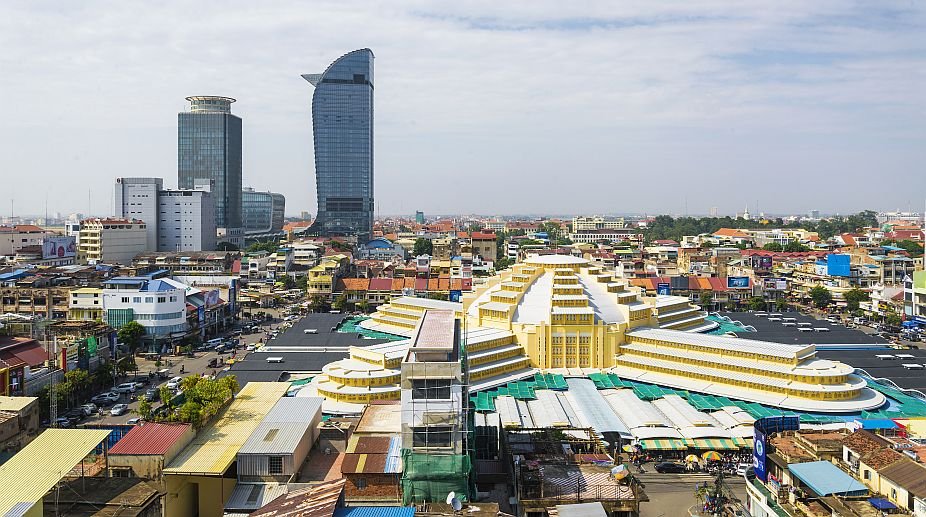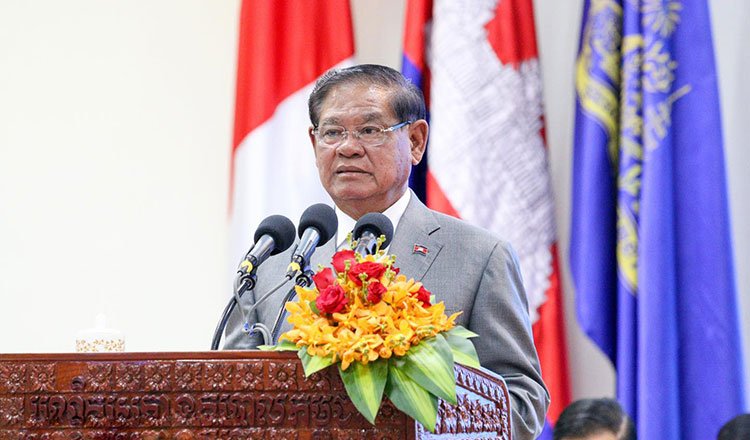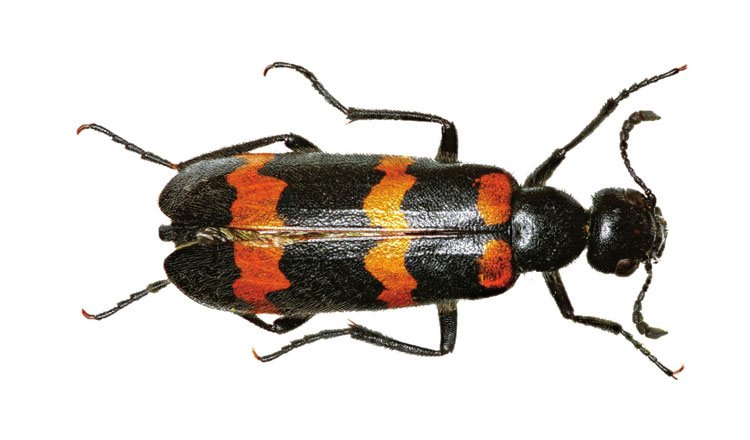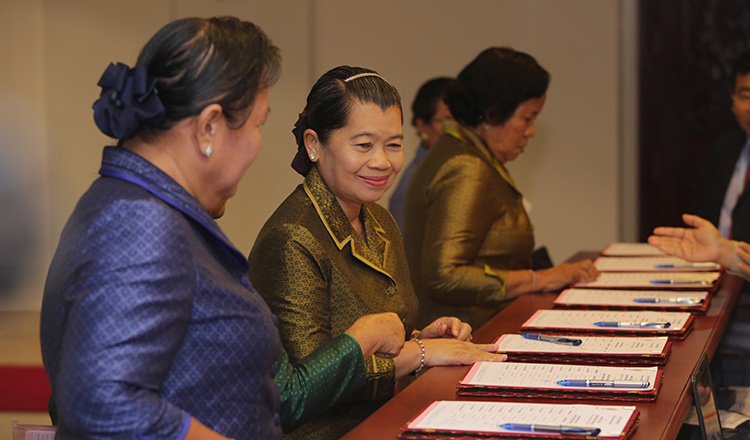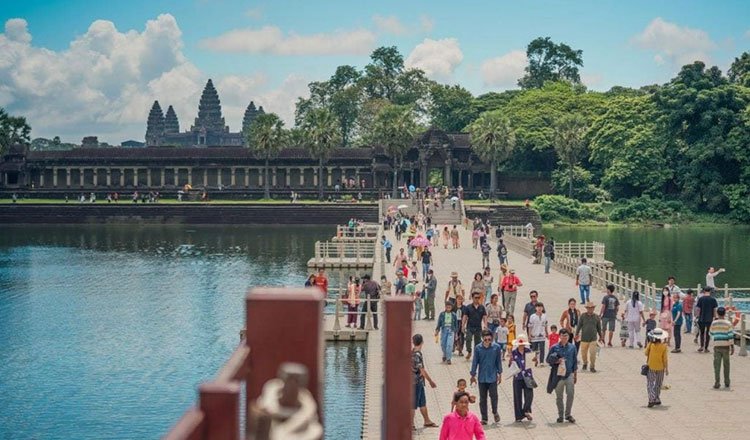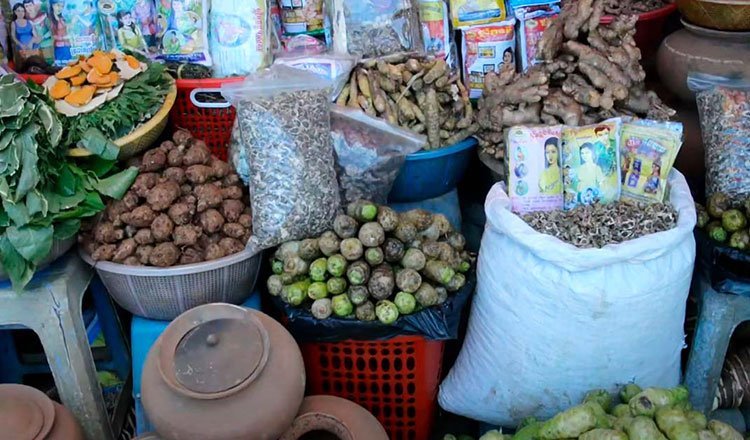-
Posts
15,821 -
Joined
-
Last visited
Content Type
Events
Forums
Downloads
Quizzes
Gallery
Blogs
Everything posted by geovalin
-
Cambodian authorities said Monday they have arrested seven Japanese nationals who are allegedly members of a fraud group. Japanese police suspect that two of the men are involved in several fraud cases in Japan, Kyodo News reported. They plan on dispatching investigators to Cambodia while procedures are under way to deport the suspects to Japan. According to investigators, the seven men were using a hotel in Cambodia as their hub. The men, aged in their 30s to 50s, had no passports, leading Cambodian police to believe they are part of a bigger gang that had coerced them into committing acts of fraud. Around May, information was provided to Cambodian authorities that a Japanese man was scamming people online from a Cambodian hotel near the Thai border. After local authorities contacted Japanese police, they managed to confiscate and check the contents of the suspect’s mobile phone and computer. He and another suspect are accused of getting a man in Saga Prefecture to invest cash in a bogus real estate deal. read more https://japantoday.com/category/crime/7-japanese-nationals-in-cambodia-arrested-over-alleged-fraud
-
PHNOM PENH, CAMBODIA — Multiple Cambodian tycoons are under fire for alleged fraudulent real estate sales to thousands of people who are struggling to pay back loans from microfinance institutions and banks used to invest in land or gated community projects. In the most prominent cases, two “oknhas” — tycoons who have given at least $500,000 to the government — have been arrested and charged with fraud in separate schemes after families in multiple provinces accused them of reneging on promised monthly dividends from land investments or homes promised in gated community projects. Hy Kimhong, director of Piphup Deimeas Investment Co., and Chea Saron, director of Chea Saron Realty Co., could spend two to five years in jail if convicted in Cambodian court. At least two other tycoons, including music producer Leng Navatra and Nuon Ak, have faced social media criticism or complaints with local authorities over real estate projects that frustrated investors say have been slow to deliver. In Kampot province, in the southern part of the country, on the Gulf of Thailand, Kimhong, who is also the director of microfinance institution AMZ, faces more than 1,000 lawsuits alleging Piphup Deimeas cheated families out of a total of $21 million. Locals in Kampot’s Chhuk district told VOA that Piphup Deimeas employees have traveled house-to-house for at least three years, promising monthly dividends for investments in land plots. Oy Chantha, 62, took out $20,000 in microfinance bank loans for his son to invest in Piphup Deimeas. At first, they received steady dividends that boosted their income from selling banana rice cakes and allowed Chantha to keep up with $500 monthly loan payments. Around the Chhuk district, farmers and sellers who invested suddenly had money to spend. They bought new cars and motorcycles. They quit their jobs at the market. They hosted parties. But in April, the cash flow stopped. Now Chantha said he is considering selling his cows and motorbikes to pay back the loans. If he cannot do so, he said, he fears his house and farmland — which he put up for collateral — could be seized. “I can’t sleep,” he told VOA. “I’m the one who has to pay. … I’ll be nothing. I’ll be zero.” Kimhong, who was also named as an adviser to outgoing National Assembly President Heng Samrin in February, has maintained his innocence. On Aug. 7, he was arrested with 13 associates, but a viral Facebook video showed him, handcuffed, telling police that “I still think that I can handle it,” meaning that he still thought he would be able to get people their back dividends soon. “The word cheat is not correct — you can say delaying,” Kimhong said in the video. “This is delaying. … We promise that we will make it back smoothly by August.” AMZ representatives did not answer a phone call from VOA, and Piphup Deimeas posted on its Facebook page on August 8 that its employees were taking time off. In another case playing out in Kampot and neighboring Takeo province, at least 2,000 families have accused local tycoon Chea Saron, director of Chea Saron Realty Co., of fraud after buying into “borey,” or gated community projects, and land plots they say never came to fruition. Heng Ith, 65, first invested $10,000 in 2020 with the promise of a spot in a borey, and started receiving $250 back monthly in dividends. Encouraged by the steady flow of money — and Saron’s “convincing” team — she told VOA she invested more and more. An associate of Saron’s would drive her to microfinance institutions and banks, including BNK, Prasac and Hattha, to get loans, and take her directly to Saron’s local office afterward, she said. But the borey — which locals identified as a group of unfinished blue buildings off a busy road in the same district — stopped construction months ago, and in December, investors like Ith stopped receiving payouts. Then in April, Saron and eight associates were arrested and charged with fraud, accused of cheating people out of a total of about $40 million. Ith still owes $57,000 in microfinance loans with her home as collateral and has sold off jewelry to make payments. The lenders have stopped their daily visits since Saron’s arrest. “If they want to boil us [alive], or do whatever they want to do with us, it’s up to them,” Ith said. “Where can we get the money?” Accusations of real estate fraud are not new in Cambodia, where the loose regulatory environment has spawned get-rich-quick schemes and ambitious projects aimed at enhancing tycoons’ reputations. Many projects have failed to materialize over the years, including a tower developers promised would be the tallest in Southeast Asia and sprawling resorts along the southern coast. Small-time oknhas may start real estate schemes to build up their image but lack money or experience, Sylvia Nam, a former assistant professor at the University of California, Irvine, who has studied real estate speculation in Cambodia, told VOA. “People are being sold a project by somebody with deep connections — or somebody who presents themselves as though they have deep connections — but maybe those connections aren’t actually that deep,” Nam said. “The line between what is legitimate versus illegitimate only comes at the moment of success. And even the moment of success is actually kind of unclear,” she added. The accusations also come at a time of overall stagnation in construction. Ross Wheble, country head at real estate consultancy Knight Frank Cambodia, told VOA that high inflation and the U.S. Federal Reserve’s recent interest rate hikes had a “direct impact” on Cambodia’s real estate sector, particularly borey projects, where buyers have struggled to make repayments on properties. “This has led to a slowdown of construction, particularly within the residential sector, with many developers now struggling with cash flow,” Wheble said. Ung Chhay, spokesman for Kampot province and deputy provincial governor, told VOA that he could not estimate how many people have been affected by fraudulent land investment schemes but that “many families” had suffered. Victims have also emerged in a handful of other provinces. We have taken measures by compromising with the financial institutions, like banks, to ask them to be understanding," Chhay said. "The banks understand and have weakened their measures[to collect on loans] while we wait for a solution. https://www.voanews.com/a/cambodian-tycoons-under-fire-for-alleged-real-estate-schemes/7224584.html
-
Interior Minister Sar Kheng instructed all ministry officials to continue to fulfill their departmental duties and unite to serve the country, while announcing his resignation as the Minister. Speaking at the graduation ceremony of about 560 cadets in police science at the Police Academy of Cambodia yesterday, Kheng emphasised that senior officials in general departments in the ministry must continue working harder to serve the country. Officials with the rank of Secretary of State and Undersecretary of State must also continue to accept the tasks assigned by the ministry because there is more work to be done, he said. “I am leaving the Ministry of Interior to attend to another duty. I hope that the officials of the general departments will continue with their efforts in doing their jobs well,” he said. Kheng said that he hoped that the officials in the ministry will continue to do their jobs better, so the ministry can continue to serve the country and the people. read more https://www.khmertimeskh.com/501342894/sar-kheng-announces-resignation-at-police-cadets-graduation-ceremony/
-
Government officials from three Southeast Asian nations say the Denver Art Museum continues to house antiquities stolen from their countries’ ancient temples and heritage sites. Representatives from Cambodia, Thailand and Vietnam sent letters to the museum, via U.S. investigators, in May and June, saying the prized relics had no legal export permits to lawfully leave their countries. The museum, they said, did not respond. “There is a taint on these cultural properties at the Denver Art Museum,” Phoeurng Sackona, Cambodia’s minister of culture and fine arts, wrote in a June letter obtained by The Denver Post. The countries are seeking the return of eight pieces in all — including six donated to the museum by Emma C. Bunker, a former Denver Art Museum trustee and research consultant. In December, The Post published a three-part investigation into Bunker’s critical role in a decades-long antiquities trafficking operation that implicated some of the world’s top museums and private collectors. READ MORE https://www.khmertimeskh.com/501343000/cambodia-thailand-and-vietnam-say-the-denver-art-museum-still-holds-their-stolen-heritage/
-
Phonm Penh/Washington — Cambodia’s incoming prime minister, General Hun Manet, had a trial run over the weekend for his most important foreign relationship, hosting Chinese Foreign Minister Wang Yi during a visit to Phnom Penh. Hun Manet assured Wang Yi that Cambodia’s new government will maintain an “unchanged stance” on Bejing’s one-China policy and a “non-interference policy” toward China, according to a message on the Cambodian leader’s Facebook page. Hun Manet also agreed to join a Belt and Road Initiative forum in China in mid-October, which is likely to be one of his first foreign trips after being sworn in to office later this month. He will join the 20th China-ASEAN exposition in Nanning, the capital of the southern Guangxi region. Following his visit to Phnom Penh, Wang Yi said the forum would promote China’s “industrial development corridor” and “fish and rice corridor,” as well as “enhance Cambodia's capacity for independent development at a faster pace,” according to a statement on the Chinese embassy’s website. He also thanked Hun Sen for his “historic contribution” to the China-Cambodia friendship and said Beijing is “ready to work with the new Cambodian government…so that the friendship between the two countries is deeply rooted in people's hearts and passes on from generation to generation.” Cambodian Prime Minister Hun Sen, right, hugs Chinese Foreign Minister Wang Yi during a meeting in Peace Palace in Phnom Penh, Aug. 13, 2023. (Kok Ky/Cambodia's Government Cabinet) However, Hun Manet received Beijing’s highest blessing long before Prime Minister Hun Sen announced last month that his eldest son would succeed him within weeks of July’s national parliamentary election. In February last year, Hun Sen brought Hun Manet to a meeting with Chinese President Xi Jinping. “His excellency the president strongly believes in Hun Manet’s capacity … to maintain the speed of development” for the country, said a senior Cambodian official after the visit. Cambodia over the past decade has become increasingly reliant on China for its economic growth, and by extension its political stability. At the same time, Cambodia has been a spoiler in regional efforts to counter China’s rising influence. READ MORE https://www.voanews.com/a/cambodia-s-hun-manet-signals-unchanged-china-policy-ahead-of-succession/7224836.html
-
A good relationship with the Cambodian government would be a prerequisite for the resumption of negotiations on overlapping claims to natural gas resources in the Gulf of Thailand, experts said, but warned of a return to a cold conflict if there were mutual reservations. The dividends of a diplomatic bonhomie would be high, as together they could exploit an estimated 1 trillion baht worth of energy resources. Political turmoil and bruised nationalism, mostly in Thailand after the military coup in 2006, became a major impediment for progress in talks between the two countries on demarcating the disputed maritime boundaries as well as jointly developing petroleum reserves in the 26,000 square-kilometre area, they said. The issue was discussed at length during a seminar on the overlapping claims of the two countries in the Gulf of Thailand. The event was jointly hosted by Chulalongkorn University’s Faculty of Law and the Foreign Ministry’s Treaties and Legal Affairs Department on August 10, even as the Thai side is still waiting for new guidelines and instructions from the yet-to-be-formed government. read more https://www.thaipbsworld.com/a-pheu-thai-led-government-could-revive-talks-with-cambodia-on-gas-exploration/
-
PHNOM PENH, Cambodia (AP) — China’s foreign minister visited Cambodia over the weekend to reaffirm his country’s commitment to the southeast Asian country after its incumbent prime minister handed off the job to his son following a one-sided election last month, officials said. Wang Yi is the first foreign leader to visit Cambodia, days after Hun Sen’s announcement that his 45-year-old son and the country’s army chief, Hun Manet, is replacing him. A video of the meeting was posted on Hun Sen’s Telegram channel on Sunday. Eang Sophalleth, Hun Sen’s spokesman, told reporters after the meeting that Wang Yi expressed China’s willingness to cooperate with the newly-appointed prime minister. Cambodia’s foreign ministry later released a statement citing Wang Yi as expressing China’s support for “the Kingdom’s emerging government leadership.” Hun Sen, the longest-serving government head in Asia, and his party sealed a landslide victory in the country’s general election after barring the main opposition group —the Candlelight Party— from contesting the polls on a technicality. Western nations and rights groups criticized the election saying it was neither “free” nor “fair.” read more https://www.thestar.com/news/world/asia/china-s-foreign-minister-visits-cambodia-days-after-incumbent-premier-hands-off-the-job-to/article_e9000723-8c84-5309-a7d8-5cef263fc231.html
-
A high school in north-eastern Cambodia has been forced to close temporarily after thousands of unexploded munitions were discovered. Cambodia remains one of the world's most heavily mined countries, 48 years after the end of its brutal civil war. At that time, the Queen Kosomak High School in Kratie province was being used as a military station. Photos show tons of rusty explosives neatly stacked in rows, with grenades and anti-tank launchers among them. In total, more than 2,000 pieces of ordnance was discovered over three days - Heng Ratana, director general of the Cambodian Mine Action Centre, told AFP news agency. He said the munitions were found when the ground was being cleared to expand a garden, and if the whole school was cleared, more would likely be dug up. "It is a huge stroke of luck for the students. These explosive devices are easy to explode if someone dug into the ground and hit them," Mr Heng said. Students were told to stay away from the school until the clean up was complete, which was expected to take two days. Cambodia's eight-year civil war ended in 1975, however it continue to suffer from the aftermath. read more https://www.bbc.com/news/world-asia-66491920
-
01000000-0aff-0242-4f2d-08db9c2f08ff_240p.mp4 Before COVID-19, Chinese investors turned Cambodia's sleepy seaside city of Sihanoukville into a ‘round-the-clock gambling hotspot. But China’s economy has been grappling with a post-pandemic slowdown, and now the buildings by the beach — abandoned by Chinese investors — have become eyesores. More on this from Hul Reaksmey in Sihanoukville. Camera: Pin Sisovann. https://www.voanews.com/a/cambodia-s-gambling-hotspot-reduced-to-ghost-buildings-/7223367.html
-

Children of elite set for top spots in Cambodian government
geovalin posted a topic in Cambodia News
With upcoming change of leader, key posts remain within influential networks PHNOM PENH -- With incoming Prime Minister Hun Manet front and center, 48 members of Cambodia's ruling elite posed for a photo on the polished stone steps of the Cambodian People's Party (CPP) headquarters on Thursday, in what appears to be a look at the Southeast Asian country's new cabinet. Manet, 45, is being handed the job directly from his 71-year-old father, Hun Sen, who has ruled Cambodia for 38 years. The eldest son's accession, which will become official on Aug. 22, is part of a carefully managed generational transition within the CPP, which is built on familial patronage networks that link the country's wealthy political, business and military elites. As the creator of and dominant force in this highly personalized system, Hun Sen has been careful to balance competing interests within the party, ensuring that grandees can pass their jobs to their children, or at least secure influential roles for them. read more https://asia.nikkei.com/Politics/Children-of-elite-set-for-top-spots-in-Cambodian-government -
Police have made another massive drug seizure in Cambodia – confiscating 465kg of methamphetamine in 2 raids The competent authority of the Anti-Drug Department (A4) led by Brigadier General Puth Sunrasmey, Deputy Director of the Department, Lieutenant Colonel Kheng Serey, Deputy Director of the Department and Lt. Col. Tep Samphan, Director of A4 Office Phnom Penh Municipal Police Commissioner Mr. Vong Savath, Deputy Prosecutor of the Phnom Penh Municipal Court, cracked down on the drug traffickers on August 8, 2023. Police executed the operation to crack down on drug traffickers crossing the border from the Golden Triangle through Laos into Cambodia at two different destinations – a guesthouse in Prek Chrey village, Sangkat Spean Thmor, Khan Dangkor, and in Sangkat Phnom Penh Thmey, Khan Sen Sok. read more https://www.khmertimeskh.com/501341542/drug-trafficking-on-a-giant-scale-police-seize-over-450kg-of-drugs-in-golden-triangle-bust/
-
Authorities have warned citizens not to eat the Yellow Meloid Beetle (Mylabris variabilis) after a husband and wife died after consuming the insects The Department of Health of Preah Vihear Provincial Administration issued the warning after a husband and wife ate the insects on August 4, 2023in Sraem Tbong village, Kantuot commune, Dam Ksan district, Preah Vihear province They were taken to Sraem commune health center for first aid and sent to the 16th of January Hospital in Preah Vihear province at 7 am on August 5 . 56-year-old Khet Ri, died on August 5, when she was taken to the 16 Makara Hospital in Preah Vihear Province. read more https://www.khmertimeskh.com/501341231/citizens-warned-not-to-eat-deadly-blister-beetles-after-2-die/
-
Political rivals claim new National Assembly president appointment was selected for her loyalty to Hun family. Cambodia’s leader Hun Sen Wednesday stressed that an upcoming Cabinet reshuffle has nothing to do with infighting among the leaders of his ruling Cambodian People’s Party, or CPP. Hun Sen, who has led the country since 1985, is preparing to step down from his role as prime minister, passing the baton of leadership to his son, Hun Manet, who will assume the position later this month. A call-in show produced by RFA’s Khmer Service this week discussed potential power struggles between Hun Sen’s family and other party leaders, including Minister of Interior Sar Kheng. Two guests speakers on the show pointed out that several high ranking CPP members have yet to declare support for Hun Manet. Hun Sen said in a voice message posted on Telegram that it wasn't necessary to respond to the comments about the lack of announced support from Minister of Defense Tea Banh and CPP vice president Men Sam An. He implied that the transfer of power to the new government later this month would be smooth. “RFA should not be too stupid, too timid and too provocative,” said Hun Sen. Khuon Sodary, seen in this 2017 file photo, will be Cambodia’s next president of the National Assembly. Credit: Heng Sinith/AP Regarding the appointment of Khuon Sodary as president of the National Assembly, he said that it had been planned in late 2021 as part of the CPP’s strategy to promote women into prominent positions. Khuon Sodary is currently the Assembly's second vice president. “If you are so stupid, you should seek clarity rather than concluding that everything is an internal dispute of the CPP,” Hun Sen said, addressing Radio Free Asia. “I request RFA as well as other foreign [media outlets] broadcasting in Khmer to always remember that the CPP has no habit of fighting one another for a power grab in the same [way] that you have, and that will lead to [your] eventual collapse due to your own internal disputes.” Finland-based political commentator Kim Sok, who left Cambodia after he was imprisoned for his criticism of Hun Sen’s government, told RFA on Wednesday that Hun Sen chose Khuon Sodary over Sar Kheng because he wields a greater amount of power within the CPP, while she does not and is therefore less of a political threat. “By choosing Ms. Khuon Sodary, it also does not mean that he really wants her for this post. He wants to choose only the people who are closest with him,” Kim Sok said. “[She] does not have enough power to be an obstacle to him [and she] is like the right hand woman to Hun Sen’s wife.” Sam Rainsy, the self-exiled president of the dissolved former main opposition Cambodia National Rescue Party, or CNRP, said that Hun Sen does not trust Sar Kheng and considers him a threat. “The position of National Assembly president is so sensitive,” said Sam Rainsy. “If [Hun Sen] were to give the post of National Assembly president to Sar Kheng, [Sar Kheng] would have the ability to allow a vote to dissolve the newly elected government and to remove Hun Manet from power.” Um Sam An, former CNRP lawmaker, told RFA that Hun Sen is trying to essentially neuter the power of both Sar Kheng and Tea Banh by appointing them to be supreme advisers to Cambodia’s king. “[Hun Sen] meanwhile, will consolidate more power for Hun Manet,” he said. “The father will be the head of the senate, holding the legislative branch in check, while the son, as prime minister, will hold the executive branch. He called the arrangement an obvious violation of the separation of powers and the system of checks and balances, as stated in Cambodia’s constitution. “There is no country in the world that would uphold a system of having a son as the prime minister and the father as the head of state,” said Um Sam An. “Not even in any of the communist countries or in North Korea.” Translated by Sovannarith Keo. Edited by Eugene Whong. https://www.rfa.org/english/news/cambodia/reshuffle-08092023173035.html Copyright © 1998-2020, RFA. Used with the permission of Radio Free Asia, 2025 M St. NW, Suite 300, Washington DC 20036.
-
The Indonesian Embassy (KBRI) has successfully repatriated 41 Indonesian nationals, the victims of online scam companies in several cities in Cambodia (5/8), including Steven and friends who had reached out to President Joko Widodo through a video appeal. The 41 Indonesians were returned to their home country in 4 separate groups from July 22nd to August 5th, 2023. The process was gradual due to the permit process and handling different cases for every person. The process was under the Ministry of Interior in Cambodia. Between June 5th and June 14th, 2023, the Cambodia National Police (CNP) rescued 41 victims of an online scam company from various provinces, including Banteay Meanchey (Cambodia-Thailand border), Svay Rieng (Cambodia-Vietnam border) and Phnom Penh. The rescue operation was conducted based on information from the Indonesian Embassy in Phnom Penh. The embassy conveyed the information to the relevant parties in Cambodia through both formal diplomatic channels and informal methods. read more https://www.khmertimeskh.com/501339426/indonesian-embassy-in-phnom-penh-repatriates-41-indonesians-from-online-scam-company-in-cambodia/
-
There are nearly seven times the number of male lawmakers in the 7th National Assembly compared to female members with 87.2% of seats occupied by men and 12.8% by women in the 125-seat parliament. The official results of the 7th National Assembly Election of the National Election Committee (NEC) revealed that 16 women won seats in the National Assembly. The percentage for men increased from the sixth mandate’s 84.8% of seats and dropped for women who had held 15.2% . The elected women are all members of the Cambodian People’s Party (CPP) with one lawmaker coming from Banteay Meanchey, another from Kampong Chhnang, one from Kampong Speu , Kampot two, Kandal one, Phnom Penh three, Prey Veng one, Siem Reap one, Svay Rieng three and two from Takeo provinces. CPP spokesman Suos Yara said the party had fielded female candidates for the 7th National Assembly Election in constituencies across the country, but whether or not they were elected depended on voters. Therefore, this isn’t an indication that the number of women running for office has declined. read more https://www.khmertimeskh.com/501339090/16-women-win-seats-in-the-7th-national-assembly/
-
Police say that a tuktuk driver, who was arrested after subjecting a young Frenchwoman to a harrowing ordeal in Battambang at the weekend, was previously convicted of another crime against a Frenchwoman in 2018 Battambang detained Tep Phaly after he injured a young Frenchwoman – a case in which outgoing Prime Minister Hun Sen made a personal intervention It has now emerged that the man was convicted for stealing a mobile phone from a French woman named Coline Bachelier in front of the gate of Battambang Provincial Referral Hospital at 22:20 on October 31, 2018, which caused minor injuries to the female victim. Major General Sat Kimsan, Commissioner of Battambang Provincial Police said that the man was detained for his latest crime after a two-day search operation Prime Minister Hun Sen intervened on Monday in the case of a young French woman who sustained injuries when escaping from the man’s tuktuk on Saturday The French national has been named as 21-year-old Helene Dietschy, a French medical student. 2023 victim Helene Dietschy She came to Cambodia for two months and worked as an intern at Calmette Hospital. read more https://www.khmertimeskh.com/501339806/man-arrested-for-attacking-frenchwoman-committed-crime-against-another-frenchwoman-in-2018/
-
Is the son with a Ph.D. in economics ready to take over for his strongman father? Cambodia’s prime minister, Hun Sen, who is stepping down later this month after four decades in power, has often suggested he is the reincarnation of a 16th century king. And he occasionally imbues his successor, Hun Manet, with similarly mythical powers. In public speeches and to his biographers, Hun Sen has insisted that blinding light shot out from a centuries-old Banyan tree upon his eldest son’s birth. “Five hundred people saw the light. That was when Manet was born,” he told the authors of Strongman: The Extraordinary Life of Hun Sen in December 1997. The anecdote, with its mythic overtones, seems calculated to portray Hun Manet as destined for the same kingly greatness as his father. But, speaking just four months after he ousted his coalition partners in a bloody coup, Hun Sen went on to tell the biographers that not only did he not want his son to walk the same political tightrope as he had, he did not think then-20-year-old Hun Manet would be well suited to it. “I would like to be the last member of my family who was involved in politics,” Hun Sen is quoted as saying in Strongman. “I would rather see [Manet] working as an assistant to a politician, helping in national reconstruction, and not become a politician himself. … It seems he is interested in study, in research, in making recommendations rather than doing things himself.” Hun Manet was appointed prime minister by royal decree on Monday and is poised to be sworn in on Aug. 22, following last month’s one-sided election. With the 45-year-old now taking the helm, many Cambodians are wondering what the rare moment of change will mean for the country. He is a trained economist and an experienced general. But as a politician he remains a cipher; and only time will tell whether he has his father’s autocratic tendencies. Cambodia's Prime Minister Hun Sen [left] stands with his son, Hun Manet, after graduation ceremonies at the U.S. Military Academy at West Point, in 1999. Credit: Reuters ‘An innocent guy’ Those who knew Hun Manet as a young man offer accounts not dissimilar to Hun Sen's. They recall a humble and conscientious youth, mild-mannered almost to the point of timidity and determined to carve out a career for himself in development economics. Hun Manet enrolled at West Point military academy in 1995, the first Cambodian ever to have done so, and one of fewer than 10 non-U.S. students in a class of more than 900. He struggled initially with communicating in English and was bewildered by cultural phenomena such as hazing, he told his father’s biographers in 2003. Kevin James, who roomed with Hun Manet for two years, described him as a “tolerant individual who, at the time anyway, didn’t have any presumptions about any one person being different from any other.” They got on so well their first year that they elected to bunk together again in their second, James told RFA. “I had zero complaints about living with Manet. He was friendly, and a kind and considerate roommate. He didn’t cause any issues, and he tolerated my smoking in the room,” recalled James, who is now a lieutenant colonel in the 101st Airborne Division. “He was an innocent guy with no airs, and this is coming from a guy from rural Pennsylvania – I was occasionally shocked at how innocent he was.” Having gained a bachelor’s degree in economics, Hun Manet continued his studies at New York University. There, he researched whether Cambodia would benefit from land reform for his 2001 master’s thesis. Back home, meanwhile, his father was beginning to parcel out the country to cronies and foreign investors in the form of economic land concessions. By 2014, according to a lawsuit, such ELCs had displaced 6% of the Cambodian population. As his father’s government continued to enrich its powerful tycoon class at the expense of the poorest, Hun Manet appeared increasingly interested in learning how the world’s worst off can be lifted out of poverty. He took an internship with the World Bank, during which time he was posted to the Congo, according to a Facebook post by Hun Sen. Afterwards, he moved to the United Kingdom, where he undertook a doctorate at Bristol University. “He was an able student, always polite and respectful, and hard-working,” his Ph.D. supervisor, Jonathan Temple, told RFA last year, adding that he expressed a desire to work in development economics. “I did not learn about his family background until his studies were well advanced.” Hun Sen’s family, including Hun Manet [back, fourth from right] and his wife, Pich Chanmony [back, fifth from right], pose during a visit by the ousted Thai Prime Minister Thaksin Shinawatra and former Thai Prime Minister Somchai Wongsawat in Nov. 2009. Credit: Reuters Family values If his studies brought Hun Manet geographically and perhaps intellectually far from his family, there was little sign that he left their orbit. In his second year at N.Y.U., Hun Manet and his then-teenage siblings spent $550,000 on a four-bedroom house in New York’s Long Island suburb, despite the fact that all were unemployed and their father’s official salary was just $12,000 a year. (In the year 2000 when the purchase took place, the house equaled 1,600 times the average annual Cambodian salary.) In 2006 Hun Manet married Pich Chanmony, the well-connected daughter of a Labor Ministry secretary of state and minister attached to the prime minister. They would go on to have three children. As with his four siblings, whose spouses are the scions of powerful families, Hun Manet’s marriage reflected a growing dynasty intertwining business, politics and personal life. In November 2011, Pich Chanmony and the son of tycoon Choeung Sopheap (whose husband is ruling-party senator Lau Ming Kan) incorporated Phnom Penh Toll Way Co. Ltd. Soon after, the company won the $10.5 million contract to renovate and then collect tolls on Veng Sreng Boulevard. A month after toll collection started in November 2015, Hun Sen had announced that the government would buy the company out. Today, Pich Chanmony chairs four companies and is on the board of another six, according to the Commerce Ministry registry. Cambodian soldiers stand guard at Preah Vihear temple in Preah Vihear province, in 2008. Credit: Chor Sokunthea/Reuters The battle for Preah Vihear Any ivory tower dreams Hun Manet might have harbored dissipated shortly after he left Bristol in February 2008. A long-running border dispute with Thailand over the Preah Vihear temple complex boiled over into live fighting in June of the same year. The clashes were well timed for Hun Sen, who used them to drum up nationalistic support ahead of the July elections. He also took the opportunity to put his son’s West Point education to the test, placing him in charge of Cambodian forces around the temples, and sending him back when tensions flared again in 2011. The world took notice. Robert Willard, the U.S. Navy admiral in charge of American forces in the Pacific at the time, told a U.S. congressional committee that by sending Hun Manet to Preah Vihear, Hun Sen appeared to be grooming him as his “heir apparent.” “This conflict builds Hun Manet’s credentials as a military leader and hero who defended national sovereignty against an external threat,” Willard told the committee. The boy who would be ‘king’ In the following years, Hun Sen’s sons and sons-in-law took on greater roles in the government and military while his daughters became business magnates, but it was increasingly clear that Hun Manet was indeed being positioned for the top job. By 2015, the topic was the focus of a rare interview with the Australian Broadcasting Corporation, with signs that the young then-lieutenant general was growing more excited by the prospect. After spending most of the conversation quietly trotting out the Cambodian People’s Party line about the dangers of upending the status quo, Hun Manet's mask slipped toward the end. The interviewer first asked him how long his father planned to stick around. A smile broke across his face, and laughing, he chided the interviewer: “Cambodia is a democracy; as long as the people want him to.” His smile grew larger when she asked, “If the people want you to, you would be prime minister?” “Not no, not yes,” he said. Tea Banh [left], minister of National Defence, places the insignia of a four-star general on the shoulder of Hun Manet, commander of the Royal Cambodian Army, during a promotion ceremony at the Ministry of Defense in Phnom Penh on April 20, 2023. Credit: Tang Chhin Sothy/AFP As speculation around Hun Manet’s future role mounted, he received promotion after promotion, moving rapidly up the military ranks. He spoke rarely with reporters and closely guarded his public image. While other members of his family today have a robust social media presence, showing off expensive watches and private jets, Hun Manet maintains only professional accounts and keeps his children mostly hidden from view. (Requests to Hun Manet for an interview went unanswered.) At times, he has shown little tolerance of criticism. In 2016, he complained to the press that he had been met with protests by the Cambodian diaspora wherever he went in Australia. “Why are they looking down on me, causing divisions and conflicts?” he asked reporters. Ou Virak, president of the Phnom Penh think tank Future Forum, said past conversations with Hun Manet left him with the impression that the future premier was sincerely interested in tackling corruption and encouraging development. But along with the premiership, Hun Sen has also bequeathed his son a country whose power structures were forged in violent struggle and are precariously interlocked. Given such an entrenched political system, anything that upsets them could be disastrous for Hun Manet personally. “At his stage, politics is still a zero-sum game to him, it could be dangerous for his family [to accept change],” he noted. Additional reporting by RFA Khmer's Keo Sovannarith. Edited by Abby Seiff https://www.rfa.org/english/news/cambodia/hun-manet-profile-08042023102754.html Copyright © 1998-2020, RFA. Used with the permission of Radio Free Asia, 2025 M St. NW, Suite 300, Washington DC 20036.
-
The Ministry of Public Works and Transport would like to inform all citizens that vehicles are not allowed to drive in reverse or turn back or stop to take pictures on Expressways. Citizens who wish to take pictures can be invited to take photos at the service areas (parking lots) at all 4 locations of the expressway. At the same time, the Ministry urges the people to respect the traffic law consistently and avoid committing any crimes for safety while traveling and maintaining order in public places. It urges drivers to : 1. “Drive responsibly” 2. “Today, tomorrow, do not have a traffic accident.” https://www.khmertimeskh.com/501337507/ministry-urges-citizens-to-drive-in-correct-direction-on-expressways/
-
Cambodia earned more than $20 million from more than 430,000 international tourists who bought tickets to Angkor in the first seven months of 2023, an increase of more than 500% over the same period in 2022. According to a press release from the Angkor Institute, in the first seven months, 439,365 foreign tourists bought tickets to Angkor Resort. Revenue was $20,317,345, an increase of 502.79% compared to the same period in 2022. More than 2.6 million domestic and international tourists visited Angkor in Siem Reap in the first seven months of this year, including 2,203,696 nationals and 439,365 foreigners. Report from the Ministry of Tourism show that in the first half of 2023, Cambodia received about 2.57 million international tourists out of a total of 11.1 million tourists, an increase of 409% compared to the same period in 2022. Top Sopheak, a spokesman for the Ministry of Tourism, said recently that the main markets were Thailand, Vietnam, China, Laos, the United States, South Korea, Indonesia, France, the United Kingdom, Malaysia and Australia. According to the latest forecast in 2023, Cambodia can receive about 5 million international tourists, an increase of 120% compared to 2022. Kampuchea Thmey https://www.khmertimeskh.com/501337271/over-500-increase-in-angkor-ticket-sales/
-
Phnom Penh, Cambodia — Cambodia's king on Monday will appoint Hun Manet the country's new leader after his father Hun Sen calls time on nearly four decades of hardline rule. Days after a landslide victory in July's election, Hun Sen -- one of the world's longest-serving leaders -- announced he was stepping down as prime minister and handing power to his eldest son. The polls were widely decried as a sham after the opposition challenger Candlelight Party was barred from running over a technicality, with the ruling Cambodian People's Party (CPP) winning all but five seats in the 125-member lower house. On Monday, following a request from Hun Sen, King Norodom Sihamoni is set to issue a royal decree making four-star general Hun Manet the prime minister. However, to officially become the country's new leader the 45-year-old and his new Cabinet must win a confidence vote in parliament set for August 22. The incoming government will usher in a crop of young ministers -- with some taking posts vacated by their fathers. While insisting he would not interfere with his son's rule, Hun Sen has promised Cambodians he will continue to dominate the country's politics. FILE - Cambodia's King Norodom Sihamoni is greeted by prime minister Hun Sen during the celebration marking the 64th anniversary of the country's independence from France, in Phnom Penh, Cambodia, Nov. 9, 2017. Having come to power in 1985, he helped modernize a country devastated by civil war and genocide, although critics say his rule has also been marked by environmental destruction, entrenched graft, and the elimination of nearly all political rivals. The United States, United Nations and European Union condemned last month's polls as neither free nor fair. Hun Sen rejected those allegations and said his handover, a dynastic succession compared by some critics to North Korea, was being done to maintain peace and avoid "bloodshed" should he die in office. He also warned that should Hun Manet's life be seriously endangered, he would return as prime minister. While groomed for the position for years, the eldest son of Cambodia's iron-fisted ruler remains untested in the political arena, analysts say. And there are few expectations Hun Manet will chart a more liberal path than his father, despite being educated in England and the United States. A member of the ruling party's powerful permanent committee, he has been the Royal Cambodian Army's commander since 2018. Hun Manet has also met some world leaders including President Xi Jinping of China, Cambodia's main ally and a significant benefactor. After stepping down, Hun Sen will become president of the Senate early next year and acting head of state when the king is overseas. https://www.voanews.com/a/cambodian-king-to-appoint-hun-sen-s-son-as-new-prime-minister/7214257.html
-
PHNOM PENH – Former Thai prime minister Thaksin Shinawatra appeared in Cambodia on Saturday to celebrate the birthday of the nation’s leader, after delaying a return to his home country amid political turmoil. The 74-year-old, who has lived in self-imposed exile for 15 years, visited the neighbouring nation, ruled by strongman leader Hun Sen, to celebrate the Premier’s 71st birthday, according to local news reports. Fresh News – an online news outlet with close links to Mr Hun Sen – cited the Premier as saying that Thaksin and his sister Yingluck Shinawatra spent a night at the leader’s residence in the capital Phnom Penh after attending his birthday party, and posted pictures of the event. The duo left Cambodia on Sunday morning, the report said, without stating their next destination. The visit took place on the same day Thaksin announced he will postpone his return to Thailand by about two weeks from an originally planned date of Aug 10, citing the need to do a health check-up. The political party his family backs, Pheu Thai Party, is, meanwhile, struggling to form the country’s next government after opposition from military-appointed lawmakers scuttled attempts by its former ally to do so. read more https://www.straitstimes.com/asia/se-asia/thailand-s-thaksin-seen-in-cambodia-after-delaying-return-from-exile
-
Traditional healers, with their deep knowledge of nature’s bounty, have long played a pivotal role in providing healthcare in Cambodia. They use an array of natural ingredients, including dried plants, roots, and tree bark, to create effective remedies for various ailments. For individuals like Rani, who discovered a cyst in her chest, these traditional medicines are not only trusted but considered essential for maintaining health. While there are concerns about over-reliance on these treatments, the public’s faith in them remains steadfast, fuelled by concerns about the quality and cost of modern medicine. In a move that seeks to enhance the credibility and effectiveness of traditional medicine, the first traditional medical school was established in Phnom Penh in 2009. Since its inception, the school has graduated 345 students, all trained in the art and science of traditional healing. The curriculum is comprehensive, spanning hygiene and anatomy lessons and field trips to the countryside to learn about medicinal plants. This formalized training supplements and professionalizes the knowledge handed down from ancestors. The aim is to foster an environment where traditional and modern medicine can coexist, working side by side to meet the healthcare needs of Cambodia’s population, 80% of whom live in rural areas where access to doctors is limited. Ancient origins https://www.khmertimeskh.com/501336921/reviving-ancient-healing-arts-cambodias-ground-breaking-approach-to-healthcare/
-
The armed forces of Thailand and Cambodia are holding the two nations’ first joint training exercise on search, rescue, and disaster relief this month. The search and rescue exercise will be held from August 6 to 19 while the Humanitarian Assistance and Disaster Relief training will be conducted from August 16 to 21. Both training exercises held in Thailand aim at enhance bilateral cooperation between the two armies. The exercises were agreed to during a meeting with General Ith Sarath, Deputy Commander-in-Chief of the Royal Cambodian Armed Forces (RCAF), and General Thitichai Tiantong, Royal Thai Armed Forces (RTARF) Chief of Joint Staff. According to a Ministry of National Defence statement yesterday, both countries discussed bilateral cooperation on border security and other issues to be resolved, as well as humanitarian issues. The statement said that the Thai Border Affairs Department requested Cambodia to establish medical exchanges between the two countries’ militaries. read more https://www.khmertimeskh.com/501336651/thai-cambodian-militaries-to-hold-joint-drills/
-
The longtime prime minister said even his wife was surprised at the recent announcement that he would step down. Outgoing Prime Minister Hun Sen said on Thursday that the recent announcement that he would transfer power to his eldest son may have been done hastily, adding that he could return to office if his son’s life is ever endangered. Speaking at an inauguration ceremony in Kandal province, Hun Sen said even his wife – Hun Manet’s mother – didn’t know about the plan to appoint the 45-year-old four star general as prime minister this month. Hun Sen had previously said that he would continue as prime minister until 2028. But on July 26, he announced on state television that a new Hun Manet-led government would be formed on Aug. 22, after the National Election Committee officially reports election results. The news came three days after preliminary results showed Hun Sen’s ruling Cambodian People’s Party winning 120 of 125 seats in the tightly controlled parliamentary election. On Thursday, Hun Sen said he was worried that infighting among senior CPP ministers could result in bloodshed if a smooth and timely transition to a new government wasn’t made. But his plan to wield influence behind the scenes as head of CPP should maintain stability, he said. “I warn you that if my son’s life is endangered, the possibility of returning to be the prime minister is that I have to come back and work,” he said. “I have to return to be the prime minister for a while. After that, I will choose who can be the next prime minister.” Hun Manet, son of Cambodia’s Prime Minister Hun Sen, is seen at a polling station on the day of Cambodia’s general election, in Phnom Penh, July 23, 2023. Credit: Cindy Liu/Reuters Still a few days left The abrupt transfer of power may be a sign that key CPP officials still don’t support Hun Manet's prime minister candidacy, said Um Sam An, a former opposition party member of parliament. Longtime CPP leaders like Interior Minister Sar Kheng and Defense Minister Tea Banh are also planning to step down this month. Um Sam An said Hun Sen has appointed Sar Kheng, Tea Banh and others to the Supreme Council of the King – which has no real authority over government affairs – to keep them out of power. But failing to share some influence could eventually exacerbate divisions within the CPP, he said. “The fact that Hun Sen consolidates power alone may result in armed conflicts that prevent the transfer of power,” Um Sam An said. “Sar Kheng may join hands with Tea Banh to prevent that transfer of power.” “So, there are still a few days left, and Hun Sen is still worried,” he said. Sar Kheng, Tea Banh and Deputy Prime Minister Men Sam An were also recently promoted to vice president positions of the CPP. Hun Sen has said he will serve as president of the Senate. CPP spokesman Sok Ey San said he didn’t know yet who the CPP would appoint as president of the National Assembly. He added that the ruling party has no internal divisions. Translated by Sovannarith Keo. Edited by Matt Reed. https://www.rfa.org/english/news/cambodia/hun-sen-hasty-08032023161709.html Copyright © 1998-2020, RFA. Used with the permission of Radio Free Asia, 2025 M St. NW, Suite 300, Washington DC 20036.
-
Cambodia's outgoing Prime Minister Hun Sen lashed out Thursday at international criticism of elections his party won against no meaningful opposition, and defended his decision to hand power to his son as necessary to avoid bloodshed. The 70-year-old has ruled Cambodia with an iron fist for nearly four decades but announced last week he was stepping down for his son Hun Manet to take over as PM this month. The move came after his Cambodian People's Party (CPP) won a landslide victory in an election last month condemned by the United States, United Nations and the European Union as not free or fair. Election authorities disqualified the only serious opposition party on a technicality, paving the way for the CPP to win 82 percent of the vote and claim all but five seats in the 125-member lower house. "I can declare that democracy in Cambodia has won," Hun Sen said on Thursday in his first speech since the polls, insisting that the critics did not represent the whole international community. He also defended his handover to Hun Manet – a dynastic succession compared by some critics to North Korea – maintaining it was needed to ensure peace in the country should he die in office. read more https://www.france24.com/en/asia-pacific/20230803-cambodia-s-hun-sen-defends-dynastic-succession-amid-international-criticism



